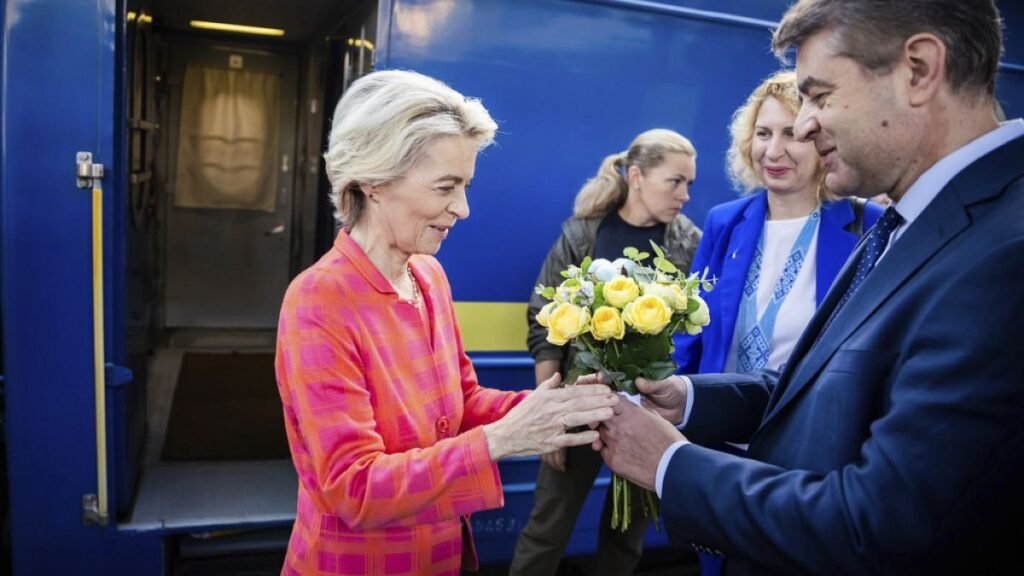European Commission President Ursula von der Leyen recently visited Kyiv to offer financial assistance to Ukraine’s damaged energy grid, which has been targeted by Russia, leading to electricity blackouts in the war-torn country. The European Commission pledged €160 million to help strengthen Ukraine’s energy network, with €100 million of that amount coming from funds obtained from frozen Russian assets. An additional €60 million will be allocated for humanitarian aid and shelters for civilians displaced by Russian airstrikes. With over two-thirds of Ukraine’s pre-war power generation capacity either destroyed, damaged, or under occupation, the country faces an uncertain winter ahead as it struggles to cope with the ongoing attacks on its energy infrastructure.
Since August, Russia has escalated its attacks on Ukraine in response to a surprise offensive by the Ukrainian military in the Kursk region. This has further strained an already vulnerable energy infrastructure in Ukraine, leaving parts of the country’s east without power for hours at a time. European Commission President von der Leyen expressed concern over Russia’s relentless assaults on Ukraine’s civilian energy infrastructure and emphasized the need for international support to help Ukraine overcome these challenges. She also mentioned the impending heating season, which is set to begin in two weeks, adding urgency to the situation.
During her visit to Kyiv, von der Leyen discussed Ukraine’s aspirations to join the European Union and the use of loans provided by the Group of Seven to strengthen Ukraine’s economy with President Zelenskyy. The EU and other global partners are committed to supporting Ukraine’s peace and recovery efforts as the country continues to deal with the devastating impact of the ongoing conflict with Russia. The European Commission’s financial assistance, including funds sourced from frozen Russian assets, will help address the immediate needs of Ukraine’s energy grid and provide essential humanitarian aid to civilians affected by the conflict.
The escalation of attacks by Russia has exacerbated the challenges faced by Ukraine in rebuilding its energy infrastructure and ensuring access to electricity for its citizens. With much of the country’s power generation capacity compromised, the risk of prolonged electricity blackouts looms large, especially as winter approaches. The European Commission’s support, including the additional €160 million pledged for Ukraine’s energy network, will help bolster the country’s resilience and mitigate the impact of ongoing hostilities on its critical infrastructure.
President von der Leyen’s visit to Kyiv underscored the importance of international solidarity and support for Ukraine as it navigates through challenging times. The European Commission’s financial assistance, coupled with efforts by other global partners, will play a crucial role in helping Ukraine address its urgent energy needs and provide essential aid to civilians displaced by the conflict. As Ukraine continues to face relentless attacks on its energy infrastructure by Russia, the need for continued assistance and solidarity from the international community remains paramount to help the country rebuild and recover from the devastation of war.
In conclusion, Russia’s targeting of Ukraine’s energy infrastructure has left parts of the country in darkness and heightened the challenges faced by its citizens as winter approaches. The European Commission’s pledge of €160 million, sourced partly from frozen Russian assets, underscores the EU’s commitment to supporting Ukraine in strengthening its energy network and providing critical humanitarian aid to those affected by the conflict. President von der Leyen’s visit to Kyiv and discussions with President Zelenskyy highlighted the need for global support for Ukraine’s peace and recovery efforts, as it continues to grapple with ongoing attacks on its civilian infrastructure. By standing in solidarity with Ukraine and offering tangible assistance, the international community can help the country overcome its current challenges and work towards a more stable and secure future.

